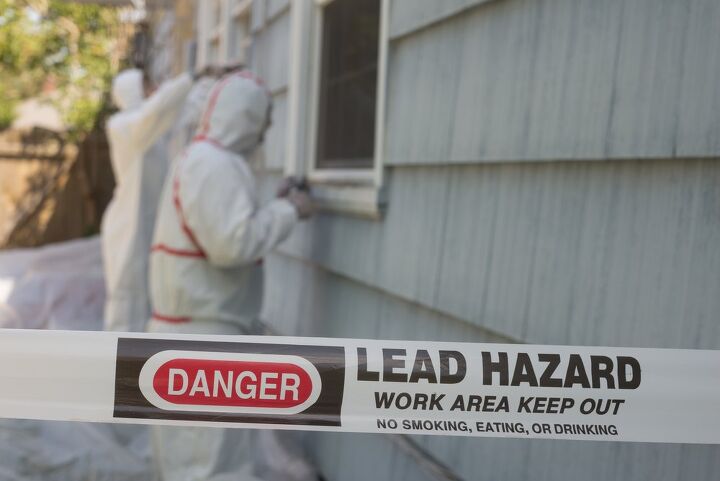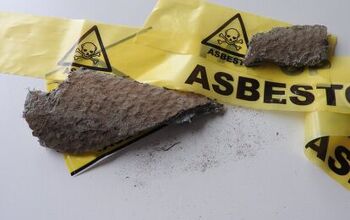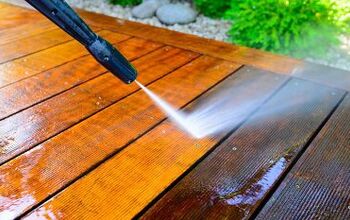Can I Sue My Landlord For Lead Paint? (Find Out Now!)

When you start a family there is a lot to be excited about. At the same time, there is a lot you may be scared of. When you start a home with your family you do your best to remove all the hazards within the dwelling. Sometimes, however, these hazards are hidden.
Lead-based paint is no longer sold in stores, but still exists in many American homes. Old homes may have lead-based paint throughout. If you live in an old home and find out the safe dwelling you rent has lead-based paint you may be furious. You might even wonder if you can sue your landlord for renting you a home with lead-based paint.
If there is lead-based paint in your home and you get sick you may be able to sue your landlord, but only in specific circumstances. Your landlord must disclose information about potential lead-based paint in the home. If you are not informed of potential lead paint and you get lead poisoning you should seek legal counsel. If your landlord took all necessary precautions you may find it difficult to sue.
Did Paint Result In Injury Or Harm
If you want to sue your landlord because of lead paint you should determine if the lead paint caused injury or harm. Simply the existence of lead paint is sometimes not enough to sue a landlord. If you have become sick since moving into the dwelling you should document this.
Save All Medical Bills
If you are concerned that the sickness you experienced was due to lead poisoning in the home, save everything. If you intend to sue your landlord for lead paint you will need evidence. All your medical bills show medical visits and injuries. These act as evidence and logs for your issues, and may be useful in a lawsuit.
What Are The Health Risks of Lead Paint?
If you are exposed to lead paint directly, or if it is ingested, you may be susceptible to lead poisoning. Lead poisoning can cause a variety of dangerous health conditions. Some of these conditions can be detrimental and irreversible.
Symptoms of lead poisoning are often hard to detect. Often people with levels of lead in their blood may appear healthy until the levels of lead become extremely high.
Developmental Problems
Children are particularly susceptible to lead poisoning. High levels of lead poisoning can cause irreversible brain development issues. These issues can often form into behavior problems and slowed growth. Lead poisoning can even cause speech and hearing issues.
Kidney Damage
Children and adults are both at risk for kidney damage when exposed to significant amounts of lead. This damage can also show itself in the body in high protein in the urine or high blood pressure. There is also an increased risk of gout.
Nervous System Problems
Lead poisoning can also cause nervous system damage. This can cause muscle weakness and may even affect your sense of touch. There is also risk of seizure in some extreme cases.
Did The Landlord Disclose Lead Information
If your landlord is renting an apartment with lead paint he or she has to follow specific laws. Lead paint, like asbestos, was very common in previous generations, before people learned of the dangers of lead.
In fact, thanks to the “Residential Lead-Based Paint Hazard Reduction Act,” a landlord who rents a home with lead-based paint of a home built prior to 1978 has to provide several disclosures. If your landlord follows these steps you will find it difficult to sue successfully, as you could have avoided the lead-based paint by not moving in.
Disclose Any Knowledge of Lead-Based Paint
If there has ever been testing done, the landlord should include this. The age of the building and the paint (if known) should also be included. Any pertinent information about lead paint in your home that is public record should be provided.
Provide You And Your Family with An EPA Form
The EPA created a form “ Protect Your Family From Lead In Your Home.” This form is meant to be a safety resource. It educates you on the dangers of lead paint. It also provides you with the best methods to use to avoid lead poisoning.
Include Warning In The Lease
When you sign a lease in a home built in the United States before 1978 the landlord must provide a warning statement. The lead warning statement should be written within the lease itself. It is not in the actual lease document it should be an attached document that you receive attached to the lease itself.
Note: There are some properties that are exempt from some or all of this list. Short-term vacation rentals and houses certified as lead-free homes are two examples of this.
Can You Prove It
If your landlord does not effectively inform you of the dangers of lead paint, you may have a case to sue the landlord. The next step you must take is ensuring you or someone in your household has lead poisoning. In addition to proving you have lead poisoning you should also prove there is lead in the home you live in.
Document Symptoms
If you find yourself sick, document your symptoms. Write a journal with dates documenting these symptoms. This information will help you as a timeline while you gather concrete evidence.
Tell Your Doctor Your Concern
If you find yourself visiting the hospital often you should tell your doctor your concern. If your doctor is aware that blood poisoning may be the cause he or she can test accordingly.
Get Blood Tests
Lead poisoning is easily tested. It is determined by a simple blood test. If you are worried the lead exposure at home is causing lead poisoning you should test your blood. Continue this testing whenever you have cause for concern.
Test Your Home For Lead
Before you accuse your landlord and sue for lead paint you must make sure the paint has lead. Contact a professional to test your home for lead paint. If your home tests positive for lead and your landlord did not inform you of this then you may have a case for sure.
Sealing Things Up
Lead-based paint is now understood to be a dangerous health hazard. If you live in a home built before 1978 there may be lead paint in the home. Your landlord is obligated to inform you of potential lead paint. If your landlord does not let you know about potential lead paint then you may have a case to sue.
Before you can sue your landlord, you should do your best to see if your landlord withholds necessary information. It is also important for you to determine if you were exposed to dangerous levels of lead. This means testing your home and testing your blood.
Regardless of who is at fault you should do your best to prevent lead poisoning. If you live in a home that may have lead paint there are several things you can do to keep a safe home. From air filters to diligent cleaning, there are several precautions you can take to protect your family. After all, it is always best to try and protect your family first rather than having to pursue damages after something tragic occurs.
Related Questions
Do Stores Still Sell Lead-Based Paint?
The United States stopped manufacturing lead-based paint for homes in 1978. This was the same year there was a federal law passed to protect those living in homes with lead paint. Lead paint is still made. Even with significant evidence showing the dangers of lead paint it is still produced today. There are several countries who have not banned the production of lead-based paint. Be sure to research any foreign country you plan to live in for an extended period of time. If you have children it is especially important to see if they banned the use of lead paint.
Can I force My Landlord To Remove Lead-Based Paint Before I Move In?
Your landlord must let you know about the dangers and potential for lead paint in the home you rent. Removing it, however, is a different story. A landlord is under obligation to disclose all knowledge of potential lead paint, but does not need to remove it. If you have young children and are worried you can certainly ask the landlord. Be prepared for the landlord to deny your request. If you are deeply concerned you may consider looking at homes built after 1978.
Should I Be Worried About Lead Pipes?
Paint is not the only place in the home you may find lead. Lead pipes are also prevalent in many old American homes. Many old pipes that carry drinking water may be held together by lead fodder or made of lead themselves. Lead dissolving into water can happen. This is a major health risk if it does occur. Some states have restricted the use of lead in water systems. If you are worried about lead in your water the best thing to do is test it. Buy a water testing kit to check the lead levels. Check these levels periodically to make sure your water is safe.

Tom Gaffey is an expert writer who currently resides in Washington D.C. Tom has a passion for real estate and home improvement writing, as well as travel and lifestyle writing. He lived the last twelve years in Hawaii where he worked closely with luxury resorts and event planners, mastering his knowledge of aesthetics and luxury products. This is where he found his passion for home improvement and a keen interest in DIY projects. Currently, Tom resides in Washington D.C, and also working on his debut fiction novel.
More by Tom Gaffey



























